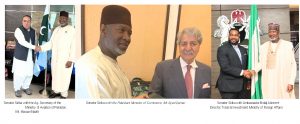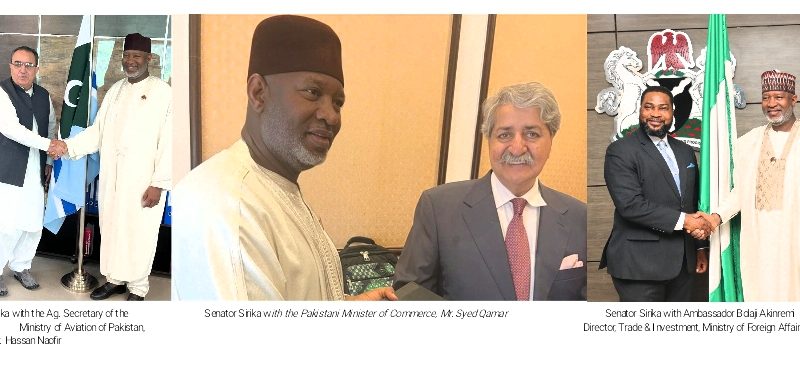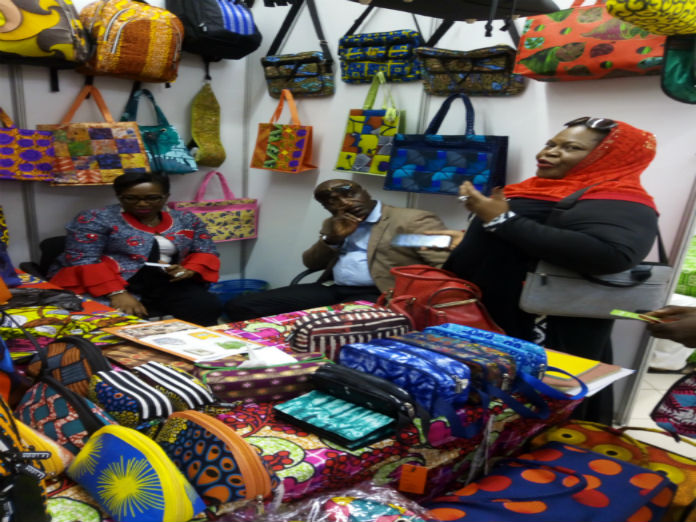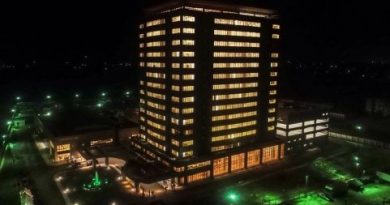Nigeria’s Journey Towards Industrialization and Economic Diversification: The Significance of the Senator Hadi Siriki-led 2023 Nigeria-Pakistan Trade Mission
Oru Leonard
Nigeria’s Journey Towards Industrialization and Economic Diversification: The Significance of the Senator Hadi Siriki-led 2023 Nigeria-Pakistan Trade Mission. Under the Buhari administration, Nigeria, as a country with vast economic potential, has embarked on a transformative journey toward industrialization and economic diversification.
Recognizing the importance of strategic partnerships, Nigeria has been fostering its bilateral relation with Pakistan, with recent efforts highlighted by the African Center for Asia +B Studies-facilitated mission to Islamabad. Led by the Minister of Aviation Senator Hadi Sirika and coordinated by the Ministry of Foreign Affairs, under the Minister’s directed guidance of Ambassador Bolaji Akinremi, this aviation-sector delegation laid the foundation for a direct flight between Nigeria and Pakistan and explored G2G and other investment interests.
This article aims to explore Nigeria’s quest for industrialization and economic diversification, with a particular focus on the evolving Nigeria-Pakistan bilateral relation and the recent mission to Islamabad. It highlights the significance of this relation in driving Nigeria’s economic growth and achieving its development objectives.Nigeria, historically reliant on oil revenue, recognizes the need to diversify its economy to ensure sustainable growth, reduce vulnerability to external shocks, and create employment opportunities for its growing population. Industrialization is a key driver of economic transformation, as it promotes value addition, technology adoption, and productivity improvements across various sectors. By embracing industrialization, Nigeria aims to build a robust manufacturing base, stimulate innovation, and enhance its global competitiveness.
The Importance of Bilateral Relations in Economic Development cannot be over emphasized as bilateral relations play a crucial role in driving economic development. They provide avenues for cooperation, knowledge exchange, trade, investment, and technology transfer. A strong bilateral relationship between Nigeria and Pakistan holds immense potential for mutually beneficial outcomes, as both countries possess complementary strengths and opportunities.
The recent African Center for Asia +B Studies-facilitated mission to Islamabad reflects the growing importance of the Nigeria-Pakistan bilateral relation. Led by Minister of Aviation Senator Hadi Sirika and coordinated by the Ministry of Foreign Affairs, this mission focused on the Aviation sector with discussions started on the means and ways of technical cooperation with the Aviation Training Institutes of the two countries, establishing direct flight between the two nations and exploring other investment opportunities.
The visit underscores the commitment to strengthen economic ties, foster G2G, people-to-people connections, and promote trade and investment. Driving Economic Growth through Trade and Investment therefore, Nigeria and Pakistan can expand their bilateral trade through strategic partnerships like the BTAs, tariff reductions, and the removal of non-tariff barriers. Both countries possess a diverse range of exportable goods, including agricultural products, textiles, machinery, and pharmaceuticals.

By leveraging the Global South Cooperation Framework, Nigeria and Pakistan can enhance trade facilitation mechanisms and explore new avenues for collaboration. The Nigeria-Pakistan bilateral relationship presents opportunities for investment and technology transfer. Nigeria’s investment-friendly environment, coupled with Pakistan’s expertise in various sectors such as energy, infrastructure, telecommunications, and agriculture, creates fertile ground for partnerships and joint ventures.
The recent mission to Islamabad paves the way for increased investment flows and collaborations in key sectors. The Role of Direct Flights in Strengthening Ties is key to the emergent robust relationship as the establishment of a direct flight between Nigeria and Pakistan holds immense significance for both countries. It fosters enhanced connectivity, facilitates business and tourism exchanges, and strengthens cultural ties. Direct flights reduce travel time, lower costs, and increase convenience, thereby promoting trade, investment, and people-to-people interactions and promoting Nigeria as the host of the Afro-Asia Hub Initiative.Collaboration in Technology Transfer and Skills Development in the fledging relationship will enable Nigeria and Pakistan to collaborate in technology transfer, innovation, and skills development to drive industrialization and economic diversification. Pakistan’s expertise in areas such as agriculture, textiles, pharmaceuticals, and information technology can benefit Nigeria, while Nigeria’s market size and resource abundance offer opportunities for Pakistani businesses. Joint initiatives can focus on knowledge sharing, capacity building, and research and development to drive innovation and competitiveness.
In Conclusion, Nigeria’s quest for industrialization and economic diversification requires strategic partnerships and collaborations. The evolving Nigeria-Pakistan bilateral relation, highlighted by the recent African Center for Asia +B Studies-facilitated mission to Islamabad, provides a solid foundation for enhanced cooperation. The leadership of the Minister of Aviation Senator Hadi Sirika and the coordination by Ambassador Bolaji Akinremi of the Ministry of Foreign Affairs demonstrate Nigeria’s commitment to strengthening ties with Pakistan. By leveraging the Global South Cooperation Framework, Nigeria and Pakistan can expand trade, attract investments, promote technology transfer, and drive economic growth.
The establishment of the Nigeria-Pakistan Chamber of Commerce, the direct flight agreement between the two countries, and the technical cooperation between Nigeria and Pakistan Aviation Training Schools further deepen the bilateral relationship and unlocks new opportunities for trade, technical and educational, tourism, and cultural exchange. The future holds great promise for the Nigeria-Pakistan partnership, as both nations work towards achieving their industrialization and economic diversification goals, ultimately leading to inclusive and sustainable development.




